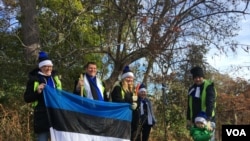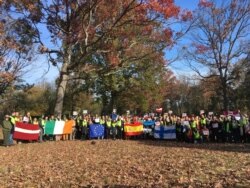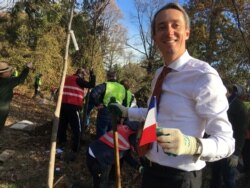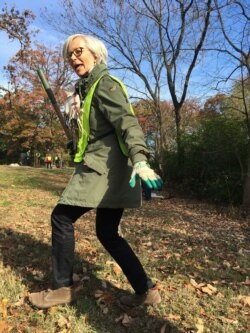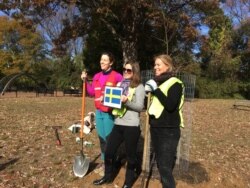Around the world, national leaders and diplomats have expressed their hopes that the United States will reverse its decision to pull out of the Paris Agreement on fighting climate change. In Washington, some others have chosen to act in small ways rather than wait.
Ambassadors and aides from all 28 members of the European Union joined forces last week with volunteers from Casey Trees, a local conservation group, to plant trees in a Washington city park, hoping to earn goodwill and make a symbolic point with their labor.
Trees soak up and store some of the excess planet-warming carbon dioxide that human activities produce.
"The best time to plant a tree is 20 years ago," the enthusiastic planters were told as they gathered in a sunny corner of Washington's Rock Creek Park by Stavros Lambrinidis, ambassador of the European Union (EU) to the United States. "The second best time is now."
Speaking afterward to VOA, Lambrinidis elaborated on the significance of individual citizens' actions.
"Every single thing every single citizen does is as important as the grand things that governments do," he said, noting that the EU has committed itself to achieving net-zero carbon emissions by 2050.
Estonian emissary Jonatan Vsevoiv, one of about a dozen ambassadors who took up shovels, said the effort "symbolizes the EU's effort on the climate front." He added that the oak tree he helped plant holds special meaning to his native Estonia, just as it does in the United States.
"I would say this is a national tree. It symbolizes strength and longevity — and stability," he said.
Having spent half of the past decade in diplomatic posts in the U.S. capital, Vseviov added that Washington has become for him "almost like my second hometown. ... I'm glad to do something that gives back to the city."
The tree-planting effort was led by Ambassador Kirsti Kauppi of Finland, which currently holds the EU's rotating presidency. She said her nation has a special affinity for trees, given that 70% of its surface is covered by woods and that Finns basically "live in and outside of the forest."
Even as Finland is often imagined as a land of ice and snow, the trees in her Nordic country "have no problem surviving the winter," she said. "Then we have a very nice summer, a lot of sunlight. That's when the trees grow."
Eva Hunnius Ohlin, senior adviser for energy and environment at the Swedish Embassy, was laboring with two other female embassy staffers when Juan Urbano, the Spanish Embassy's robust agricultural attaché, offered a hand.
The self-sufficient women declined his offer, but Ohlin cheerily told Urbano he should not take it personally "because we had earlier turned down the Finnish ambassador."
On a more serious note, Ohlin told VOA that her embassy has been increasingly engaged on climate change with institutions on the city and state level, even as the federal administration is seen as retreating on the issue.
The interest in the issue in the big coastal states such as New York and California is well known. But, Ohlin said, citizens are also active "in the middle of the country," in states like Colorado.




